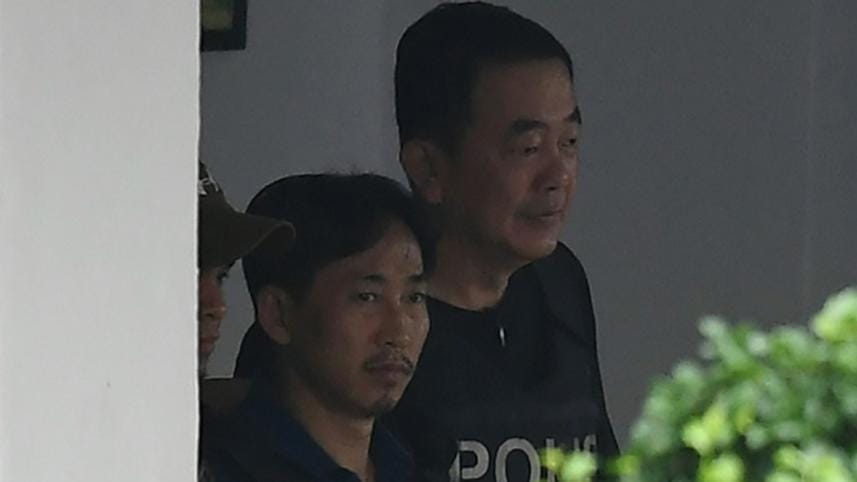Malaysian police releases North Korean suspect

The only North Korean arrested over the assassination of Kim Jong Nam was released Friday, with frustrated Malaysian police saying they believed he was involved in the plot but lacked evidence to prove it.
Ri Jong-Chol is among eight North Koreans suspected of involvement in the dramatic killing of Kim, the half-brother of the reclusive nation's leader, who was poisoned with a banned nerve agent at Kuala Lumpur International Airport.
Malaysia's attorney general has announced there was insufficient evidence to charge 47-year-old Ri and that he would be deported on Friday.
As he was led out of a police station outside the capital under tight security and handed over to immigration authorities, police chief Khalid Abu Bakar said he regretted the release.
"We believe that Ri Jong Chol played a part in Kim Chol's murder but unfortunately we lack evidence to charge him," he told AFP, using the name given in the passport carried by Kim Jong-Nam.
"We are frustrated because of a lack of evidence," he said via text message from Saudi Arabia where he is on a religious pilgrimage.
However, he denied political or diplomatic pressure had been a factor in the release, saying it was purely an investigative issue.
A senior police official who asked not to be named told AFP that Ri had been handed over to immigration authorities in the administrative capital of Putrajaya.
"I do not know when he will be deported as they will need to sort out the travel documents," he said.
The vehicle carrying Ri, who wore a bulletproof vest, was escorted by a six police-car convoy and motorcycle outriders. Roads were sealed off as the motorcade left the police station where he has been held.
Women face execution
Ri's release came two days after two women -- one Vietnamese and one Indonesian -- were charged with murdering Kim.
Seven other North Koreans are wanted in connection with the killing, including a diplomat and an airline employee who are believed to be in Malaysia.
Four others are thought to have fled to Pyongyang on the day of the murder.
Ri was arrested days after Kim suffered an agonising death when he was attacked as he waited to board a flight to Macau.
CCTV footage shows two women approaching the heavyset 45-year-old and apparently smearing his face with a cloth.
Police say he suffered a seizure and died less than 20 minutes later. Swabs of the dead man's face revealed traces of VX, a synthetic chemical so deadly that it is classed as a weapon of mass destruction.
Indonesian Siti Aisyah, 25, and Doan Thi Huong, 28, from Vietnam, face the death penalty if found guilty. Both women say they thought they were merely taking part in a prank video.
South Korea has pointed the finger of blame at North Korea, citing what they say was a standing order from leader Kim Jong-Un to kill his exiled half-brother who may have been seen as a potential rival.
North Korea, which has not acknowledged the dead man's identity, has vehemently protested the investigation, saying Malaysia is in cahoots with its enemies.
In response, Malaysia has cancelled a visa-free travel deal with North Korea -- a key conduit to the outside world -- and recalled its envoy to Pyongyang.
On Thursday a senior North Korean diplomat leading a delegation to Kuala Lumpur reiterated Pyongyang’s assertion that Kim had died of a heart attack, dismissing the use of a toxin, and urged Malaysia to release his body.
Police chief Khalid quashed the claims.
"Our investigations supported by expert reports confirmed that Kim was murdered. North Korea can say what they like but the facts remain," he told national news agency Bernama.
Malaysia on Friday also stepped up its criticism of the use of the banned nerve agent, condemning "the use of such a chemical weapon by anyone, anywhere and under any circumstances".
"Its use at a public place could have endangered the general public," the foreign ministry said, adding that the Hague-based Organisation for the Prohibition of Chemical Weapons was helping it investigate.



 For all latest news, follow The Daily Star's Google News channel.
For all latest news, follow The Daily Star's Google News channel.
Comments